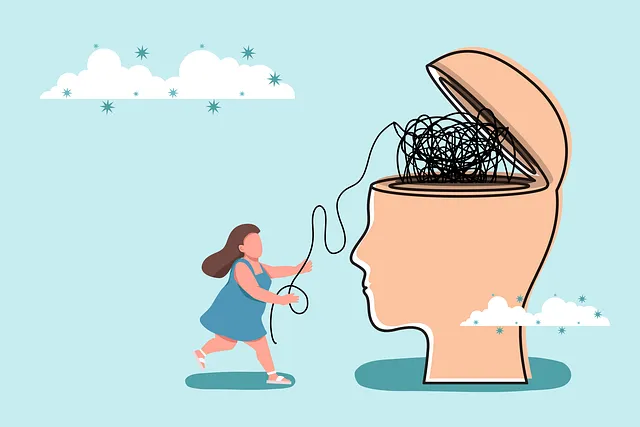Kaiser Permanente's mental health locations in Parker, Colorado, prioritize cultural competency through specialized programs and extensive training. They create an inclusive environment by recognizing cultural barriers, respecting individual values, and offering tailored care for diverse patient needs. Their holistic approach, including workshops, simulations, and self-care practices, enhances patient outcomes, satisfaction rates, and fosters a culturally sensitive healthcare system, setting a standard for respectful treatment across all backgrounds.
Healthcare provider cultural competency training is an evolving necessity in today’s diverse society. This article explores the significance of cultural competence within healthcare, using Kaiser Permanente’s mental health locations as a case study. We examine how cultural awareness improves patient care and outcomes, drawing from real-world applications like Parker Community. Effective training strategies are discussed, offering insights into engaging providers for optimal patient interactions, inspired by Kaiser’s model and Parker’s successes.
- Understanding Cultural Competency in Healthcare: A Necessary Approach
- Kaiser Permanente's Mental Health Locations: A Case Study
- The Impact of Cultural Awareness on Patient Care and Outcomes
- Strategies for Effective Training Programs: Engaging Healthcare Providers
- Real-World Applications: Success Stories from Parker's Community
Understanding Cultural Competency in Healthcare: A Necessary Approach

In today’s diverse society, cultural competency within healthcare is more than a suggestion—it’s a necessity. This concept revolves around understanding and appreciating the cultural differences that shape individuals’ experiences with health and wellness. At Kaiser Permanente mental health locations in Parker, for instance, recognizing these nuances is pivotal to providing effective care. When healthcare providers can navigate cultural barriers, they create an environment where patients feel heard, understood, and supported—a crucial step towards fostering emotional well-being promotion techniques and mood management.
Cultural competency training equips professionals with the skills to adapt their practices, ensuring that diverse patient populations receive tailored care. This includes learning about various cultural beliefs related to mental wellness, which often influence how individuals express and cope with psychological distress. By integrating these insights into treatment plans, healthcare providers can facilitate positive outcomes while respecting individual values. Moreover, initiatives like the Mental Wellness Podcast Series Production can play a role in this process by disseminating knowledge and raising awareness about cultural competency among both professionals and the general public.
Kaiser Permanente's Mental Health Locations: A Case Study

Kaiser Permanente’s Mental Health Locations in Parker, Colorado, serve as a shining example of integrating cultural competency into healthcare delivery. This case study highlights their commitment to addressing the unique needs of diverse patient populations through specialized programs and services. By focusing on emotional regulation and mental wellness coaching, Kaiser Permanente has developed innovative practices that foster a more inclusive environment for all individuals seeking mental healthcare support.
The organization’s approach emphasizes cultural sensitivity in mental healthcare practice, ensuring that staff are equipped with the knowledge and skills to provide respectful, understanding, and effective care. This holistic development initiative extends beyond traditional treatment methods, encompassing cultural competency training for employees and tailoring services to reflect the diverse backgrounds and preferences of the community they serve. Such efforts have significantly contributed to improved patient outcomes and enhanced satisfaction rates, solidifying Kaiser Permanente’s reputation as a leader in progressive mental healthcare delivery.
The Impact of Cultural Awareness on Patient Care and Outcomes

Cultural awareness plays a pivotal role in shaping patient care and outcomes at healthcare providers like Kaiser Permanente mental health locations in Parker. By integrating self-esteem improvement strategies and empathy building techniques, medical professionals can create an environment that fosters trust and understanding among diverse patient populations. This cultural competency training is essential, as it equips staff with the knowledge to address unique needs and preferences, leading to better engagement and adherence to treatment plans.
Incorporating mental health education programs designed with a strong cultural lens can significantly impact patient outcomes. Recognizing and respecting individual beliefs, values, and backgrounds allows for tailored interventions that resonate with patients from various ethnic, racial, or socioeconomic groups. This personalized approach not only enhances the quality of care but also encourages open communication, ensuring every patient receives support tailored to their specific mental health needs.
Strategies for Effective Training Programs: Engaging Healthcare Providers

Effective cultural competency training for healthcare providers requires engaging strategies that cater to diverse learning styles and foster meaningful participation. At Kaiser Permanente mental health locations in Parker, for instance, workshops and simulations can be powerful tools to break down barriers. Incorporating interactive activities, case studies reflecting real-world scenarios, and group discussions encourages active learning and strengthens the retention of cultural nuances.
Additionally, integrating self-care routine development for better mental health and emotional healing processes into the training curriculum is essential. By teaching empathy building strategies, healthcare providers can improve their interactions with patients from diverse backgrounds. This not only enhances patient outcomes but also fosters a more inclusive healthcare environment, ensuring every individual receives care tailored to their unique needs and cultural context.
Real-World Applications: Success Stories from Parker's Community

In the vibrant community of Parker, Kaiser Permanente has been at the forefront of pioneering cultural competency training for healthcare providers. Their approach has transformed local mental health services, fostering a more inclusive and sensitive environment. The success story of Parker’s mental health locations is a testament to the power of these initiatives. By integrating Cultural Sensitivity in Mental Healthcare Practice, healthcare professionals have enhanced their ability to connect with diverse patient populations.
This training extends beyond theoretical knowledge, encouraging practitioners to adopt self-care practices and engage in mental wellness journaling exercises. The impact has been profound; patients from various cultural backgrounds now receive more personalized care, leading to improved outcomes. Parker’s experience showcases how such initiatives can revolutionize mental healthcare, ensuring every individual receives respectful, culturally competent treatment, regardless of their background.
Cultural competency training is a game-changer in healthcare, as evidenced by successful programs like Kaiser Permanente’s mental health initiatives and real-world applications in Parker. By understanding diverse cultural contexts and enhancing awareness, healthcare providers can significantly improve patient care and outcomes. The strategies outlined in this article provide a roadmap for effective training, fostering inclusive environments that benefit both patients and practitioners. Embracing cultural competency is not just essential; it’s a step towards creating a more equitable and accessible healthcare system for all.






